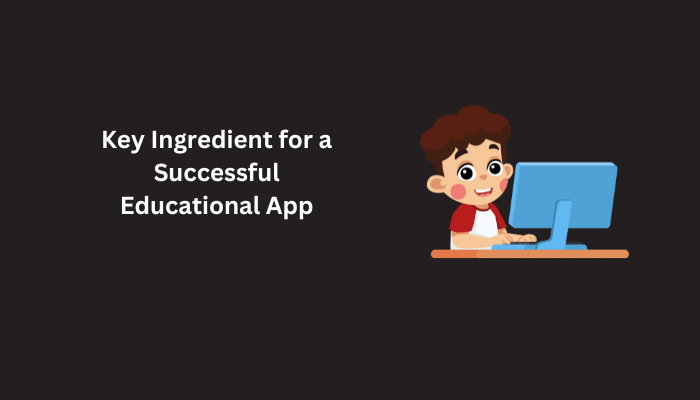In the digital era, it is an unavoidable scene to have kids sitting with a phone or tablet, skyrocketing their screen time massively. However, as a parent, you can leverage this engagement with digital devices to add some educational value.
Here come the learning apps for kids that can add academic value to your child’s screen time and make learning more engaging and fun.
According to a recent meta-analysis of 36 studies found a positive impact of apps on learning. This impact seems to increase with age, meaning that older children may be more likely to learn from apps than younger children.
Although finding the right educational apps for children aged 5-8 can be a daunting task for many parents and educators. The market is flooded with options, and distinguishing between genuinely educational apps and those that are merely entertaining, often without substantial learning value, requires insight and understanding.
To help you with the same, we have compiled a list of the best learning apps for kids aged 5-8 based on tried and tested methods. Without further ado, let’s dive into the list of apps.
Top Learning Apps for Kids Age 5-8
There are many apps available for both Android and IOS users. We have selected the top ones for you to pick the best for your child.
MarcoPolo Ocean
Dive into ocean life with this interactive app that teaches children about marine species and habitats through exploration and games. Download the app here.
Stack the States
Make learning U.S. geography fun with games that teach about state shapes, capitals, and geographical locations. Get the app here.
Barefoot World Atlas
Explore a globe filled with interactive elements that bring the cultures and animals of the world to life. Get the app here.
Seek by iNaturalist
Encourage outdoor exploration with this app that helps kids identify plants and animals in their environment. Find the app here.
ScratchJr
Introduce young children to programming by allowing them to create their own interactive stories and games. Get the app here.
Play and Learn Engineering
Combine fun and learning where children solve puzzles and build structures, introducing them to basic engineering concepts. Download the app here.
Kahoot! Numbers by DragonBox
Focus on early math skills through playful, engaging activities. Get the app here.
Khan Academy Kids
Free, fun educational program with thousands of activities and books that cover a wide range of subjects. Download the app here.
Writing Wizard
Help kids learn to write letters and numbers through a fun, supportive app. Get the app here.
Epic – Kids' Books & Reading
Offers access to a vast library of children's books, videos, and educational quizzes. Download the app here.
Write About This
Inspire young writers with pictures and prompts that spark their imagination. Download the app here.
Teach Your Monster to Read
A phonics and reading game that takes children on a magical journey, helping them develop early reading skills. You can get the app here.
Read Along by Google
Encourage reading with a friendly app that listens while your child reads aloud, offering help and rewards. Get the app here.
Thinkrolls Play & Code
Teaches problem-solving and coding basics through fun logic puzzles. Get the app here.
Winky Think Logic Puzzles
Challenges kids with color and shape-based puzzles, enhancing their critical thinking. Get the app here.
Montessori Crosswords
Help kids develop their reading, writing, and spelling skills through engaging crossword puzzles. Download the app here.
Wait, we know this is a long list to go through every app, but certain factors were considered while compiling this list. Take a look at them so you can be carefree while leaving your child alone with these apps.
Key Ingredient for a Successful Educational App

There are multiple factors that define the success of an educational app. Let’s take a deep dive into these factors.
Interaction with the App Beyond Passive Engagement
Successful learning apps require active participation from the child, promoting interaction rather than passive consumption.
Joy and Interest in Enhancing Learning
Apps that succeed are those that make learning a joyous and interesting endeavor, thus capturing and maintaining children's attention.
Minimizing Both On-Screen and Off-Screen Distractions
A focused learning environment is crucial, both within the app and in the child’s immediate surroundings.
Relatable and Applicable Learning
Content that children can relate to and apply in their daily lives tends to resonate more with them, reinforcing learning and interests.
Risks of 'Freemium' Apps and Unexpected Expenses
Parents should be wary of apps that might require in-app purchases, which can lead to unexpected costs.
Social Interaction Within Apps to Enhance Learning
Apps that include a social element, such as sharing achievements or cooperative play, can enhance learning experiences. Just be careful not to let your child be exposed to other cyber threats.
Strategies for Discovering Quality Educational Apps
Discovering great apps involves reading reviews, checking educator recommendations, and understanding the developmental needs and interests of the child.
However, it is necessary to not let your child spend too much time on screen as it can affect their health in bad ways.
Limiting Screen Time for Kids Age 5-8
Current health guidelines emphasize specific limits on screen time, stressing the importance of the quality of digital interactions rather than the quantity. As digital devices become increasingly embedded in our daily lives, it's crucial to understand the evolving role of screen time in children's education and development.
The American Academy of Child & Adolescent Psychiatry (AACAP) provides valuable guidelines for managing screen time. These include recommendations on how actively parents should be involved in their children's digital activities and the importance of setting appropriate boundaries to ensure a healthy balance.
Digital Technology: Friend or Enemy?
A study by the Gonski Institute for Education provides insights into the impact of digital education on children. While digital resources can add value to the educational experience, they can cause harm as well. The study suggests that thoughtful integration of digital resources can enhance educational outcomes and engage children in meaningful learning experiences.
Though we live in a digital era, it is recommended that digital tools be used to complement traditional learning methods, ensuring that technology serves as a tool for enhancement rather than a replacement.
This fosters a balanced approach to child development. In the era of digital learning, wisely navigating the app ecosystem can transform screen time from a passive activity into a rich, educational journey.
While navigating through the vast ocean of digital apps, complementing your child's app-based learning with Funfox's personalized online tutoring could be the key to unlocking their full academic potential.





















